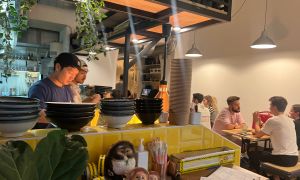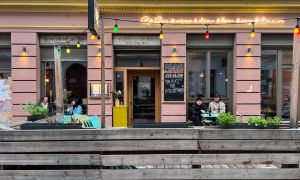The restaurants below are different in terms of atmosphere and culinary concept; some feature vegetarian-forward menus, shared plates, or pan-Asian dishes, others might focus on natural wines. What unites them all is how emphatically cool they are. And slightly overpriced. Below, the hottest restaurant in Vienna currently.
For the past decade, Mochi has been the go-to restaurant for Vienna’s well-heeled and well-informed Millennials. Show parents the place across the Danube Canal they keep hearing about? Mochi. Friends visiting from abroad? Mochi. Jazz up that dreadful covid-plagued Saturday evening? Mochi (delivery).
Mochi's short menu is centered on sushi and sashimi but other Japanese classics also appear. The karaage, bits of crunchy and tender chicken thighs, is as good as at a Tokyo food vendor. The yakitori – grilled and skewered meat anointed in a soy and mirin-spiked sauce – is charred and smoky. The wine list runs deep, with “classy” and “wild” options from Austria and abroad. A full meal and a drink comes out to €45 or so per person, less than in some other cities for similar fare; no surprise that Mochi received a Bib Gourmand award from Michelin.
The success prompted the owners to expand the brand and today the group has three additional locations in Vienna, with concepts ranging from ramen to specialty Asian food retail. All of them well-oiled operations. Advance reservation is a must.












